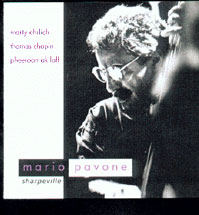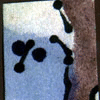|
Temporarily out of stock.
|
|
 [PSR#J090885] [PSR#J090885]
PERSONNEL
Mario Pavone – bass Marty Ehrlich – alto sax, soprano sax, clarinet, flute and alto flute Thomas Chapin – alto saxophone, flute and bass flute Pheeroan Ak Laff – drums Mark Whitecage – alto sax (track 6) Peter Mceachern – trombone (track 6) John Betsch – drums (track 6)
TRACKS 1. bi cycle2. bass ballad 3. three m 4. double 5. two flutes 6. sharpeville7. chimera 8. aku 9. ark two 10. 4 up, 1 down
|
|
about
Recorded in 1985, Sharpeville was originally released on bassist/composer Mario Pavone's own Alacra label in 1988, and is reissued here for the first time on CD. "The music on this disc was conceived and recorded when apartheid, and the resulting violent confrontations between blacks and the white government of South Africa were rampant, long before the release of Nelson Mandela from decades in prison," explains Pavone in the liner notes. "At the time, I felt the need to express my outrage at the situation there generally, and specifically at the incidents that took place in the Shapeville Township."
|
|
Reviews
| Pavone writes exceptionally well, often building things on repeated figures, which would seem a logical way for a bassist to compose, but he uses this approach in a lot of different ways. One is impressed by the simple lyricism wedded to an advanced harmonic sense. At times the writing evokes Dave Holland's better efforts, especially Conference of the Birds. This is a most welcome reissue, particularly in light of the limited number of Chapin recordings available. |
| — Duck Baker, DownBeat |
| Pavone, like Mingus before him, is a powerful force at the bass. Pairing Ehrlich with Chapin was, on flute, like pairing Rahsaan Roland Kirk and Eric Dolphy. The title track adds Mark Whitecage, Peter McEachem and John Betch for what seem to be a preview of Pavone's compositional and arranging talents that he later displayed on his excellent New World Records discs Toulon Day sand Song For (Septet). |
| — Mark Corroto, AlAboutJazz.com |
| While the music is bracingly free and 'outside,' Pavone's compositions have a coherence that is readily grasped by the attentive listener. His unaccompanied solo piece, 'Aku,' for instance, has a beautiful and crystal-clear melodic essence. The sounds and rhythmic concepts vary widely from track to track, keeping the music in motion and the interest level high. |
| — David R. Adler, All Music Guide |
|
 [PSR#J090885]
[PSR#J090885]
